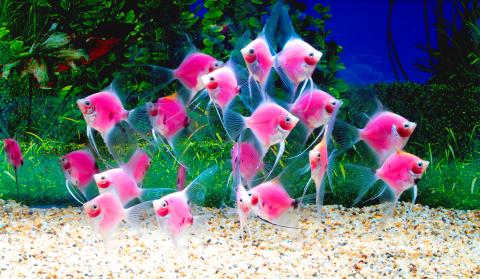The world’s first-ever pink florescent Pterophyllum scalare, commonly known as the angelfish, were showcased in an exhibit on Wednesday prior to the Taiwan International Aquarium Expo, which opens today.
Lin Yu-ho (林育禾), president of Jy Lin Trading Co — the company that cooperated with National Ocean University and Academia Sinica on developing the fish — said this was the first time the world had seen a pink angelfish since the fish was discovered in the Amazon.
Despite the 32 colors developed worldwide for the angelfish, the fish lacked the cells to create any color resembling pink, Lin said, adding that the company had accomplished the endeavor after three years of research with the university and Academia Sinica.

Photo courtesy of National Taiwan Ocean University
Lin said the florescent proteins that would be able to display a “pinkish” color were discovered by National Kaohsiung Marine University associate professor Chen Ming-chyuan (陳鳴泉) on acropora corals growing near Taiwan.
National Ocean University assistant professor Gong Hong-yi (龔紘毅) discovered that the fish would be born pink if micro-transfusion methods were used to transfuse the protein into angelfish eggs.
The research group at Academia Sinica, which consisted of researcher Wu Chin-lieh (吳金洌) and associate research fellow Chen Chih-yi (陳志毅), collaborated to inject the proteins into the eggs.
The research team said that the micro-transfusion process had been very difficult due to the fragility of the angelfish eggs, adding that on average they had been able to successfully transfuse the proteins into only one egg per 10,000 at first.
The team said they were able to raise the success rate to 1 percent after three years of research.
Despite the first appearance causing quite an uproar, with one foreign buyer even offering NT$100,000 for one of the genetically modified fish, the company was forced to decline until the species passes safety assessments in field tests.
Jy Lin general manager Ou Mei-ju (歐梅如) said the only florescent fish currently on the market is the zebrafish, which mostly features green and pink colors.
However, Ou said the florescent colors of the zebrafish can only be observed at night, while the florescent lighting of the company’s angelfish can be seen even in broad daylight.
Additional reporting by Chen Yi-ching and Yu Chao-fu

TRAFFIC SAFETY RULES: A positive result in a drug test would result in a two-year license suspension for the driver and vehicle, and a fine of up to NT$180,000 The Ministry of Transportation and Communications is to authorize police to conduct roadside saliva tests by the end of the year to deter people from driving while under the influence of narcotics, it said yesterday. The ministry last month unveiled a draft of amended regulations governing traffic safety rules and penalties, which included provisions empowering police to conduct mandatory saliva tests on drivers. While currently rules authorize police to use oral fluid testing kits for signs of drug use, they do not establish penalties for noncompliance or operating procedures for officers to follow, the ministry said. The proposed changes to the regulations require

The Executive Yuan yesterday announced that registration for a one-time universal NT$10,000 cash handout to help people in Taiwan survive US tariffs and inflation would start on Nov. 5, with payouts available as early as Nov. 12. Who is eligible for the handout? Registered Taiwanese nationals are eligible, including those born in Taiwan before April 30 next year with a birth certificate. Non-registered nationals with residence permits, foreign permanent residents and foreign spouses of Taiwanese citizens with residence permits also qualify for the handouts. For people who meet the eligibility requirements, but passed away between yesterday and April 30 next year, surviving family members

Taipei, New Taipei City, Keelung and Taoyuan would issue a decision at 8pm on whether to cancel work and school tomorrow due to forecasted heavy rain, Keelung Mayor Hsieh Kuo-liang (謝國樑) said today. Hsieh told reporters that absent some pressing reason, the four northern cities would announce the decision jointly at 8pm. Keelung is expected to receive between 300mm and 490mm of rain in the period from 2pm today through 2pm tomorrow, Central Weather Administration data showed. Keelung City Government regulations stipulate that school and work can be canceled if rain totals in mountainous or low-elevation areas are forecast to exceed 350mm in

China Airlines Ltd (CAL) yesterday morning joined SkyTeam’s Aviation Challenge for the fourth time, operating a demonstration flight for “net zero carbon emissions” from Taiwan Taoyuan International Airport to Bangkok. The flight used sustainable aviation fuel (SAF) at a ratio of up to 40 percent, the highest proportion CAL has achieved to date, the nation’s largest carrier said. Since April, SAF has become available to Taiwanese international carriers at Taipei International Airport (Songshan airport), Kaohsiung International Airport and Taoyuan airport. In previous challenges, CAL operated “net zero carbon emission flights” to Singapore and Japan. At a ceremony at Taoyuan airport, China Airlines chief sustainability